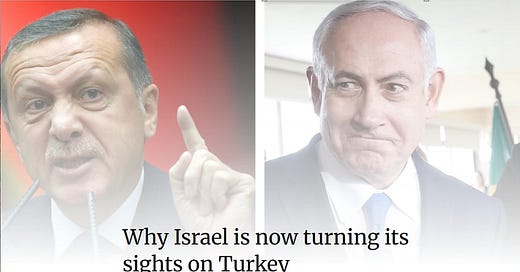Apparently wars with Syria, Lebanon, and Iran along with a gruesome ethnic cleansing in Gaza and increasingly in the West Bank aren’t enough for Benjamin Netanyahu’s government.1
Triti Parsi explains that Israel is starting to focus more on enmity with Türkiye. (Responsible Statecraft apparently hasn’t yet adopted “Türkiye” as the English version of the country’s name. Also Britannica is apparently not quite there yet, either: “Turkey, also called Türkiye.”)
Even though this rivalry [of Israel with Iran] is far from being over, and Israel is far from being the clear victor, it has already started glancing toward the next state that needs to be subjugated in order for Israel to achieve military hegemony in the Middle East: Turkey. (Israel's doctrine is to achieve security not through balance, but through domination).
Turkey's victory in Syria pushes it deeper into Israel's focus. But Turkey is different from Iran: It is a member of NATO and the G20, its economy cannot easily be sanctioned, it is a Sunni power with stronger soft power in the broader Middle East than Shia Iran has enjoyed for the past 10-15 years. Turkey, of course, has several vulnerabilities as well, including the Kurdish separatist movement.
But as long as Israel believes its security can only come through militarily dominating all its neighbors that can pose a challenge to it — that is, those who have the capacity to do so regardless of whether they have the intent or not — then Turkey's emergence as a major power in the region will put it into Israel's crosshairs, whether it likes it or not.
Türkiye backed the Syrian takeover by the Islamist group that is now its national government, headed by Ahmed al-Sharaa.
As Le Monde Diplomatique reports, relations between Türkiye and Israel have become notably worse since 2008:
In December 2008 Israeli prime minister Ehud Olmert met his opposite number in Ankara. Israel was about to launch Operation Cast Lead, the ground and air offensive against Gaza in response to rocket fire on Israeli territory by Hamas. The operation resulted in 1,400 Palestinian and 13 Israeli deaths. ‘We were humiliated. Olmert could have not come, or could have at least warned us of what was being prepared,’ a Turkish diplomat told me at the time. At the World Economic Forum in Davos the following month, Erdoğan criticised the operation and called President Shimon Peres a ‘child killer.’ With the world’s cameras on him and furious at being interrupted, Erdoğan repeatedly demanded ‘one minute’ to finish his statement before storming off the stage. The incident boosted his popularity across the Middle East.2
As the LMD report notes, Israel also has common interests with Türkiye. So hostility is not inevitable. At the same time, it also describes major points of tension:
[T]he Israeli foreign minister has described the Kurdish people as the country’s ‘natural ally’ (Times of Israel, 10 November 2024). And political scientist Halil Karaveli believes an independent Rojava – a currently autonomous Kurdish enclave in the northeast of Syria – is all the more of a headache for Turkey given that it could ‘provide Israel with a strategic ally at the crossroads of Anatolia, Mesopotamia and the Levant’. Besides, Karaveli concludes, ‘Israeli ambitions are largely behind the current historic Kurdish opening,’ following Abdullah Öcalan’s February 2025 call for the PKK to lay down its arms.
‘After Lebanon, Israel’s next target will be our homeland,’ Erdoğan stated at the opening session of parliament on 1 October 2024. While many observers, particularly Israelis, maintain that Tel Aviv does not have the resources to open up an additional front against Ankara – especially since a major confrontation with Iran seems to be the Israeli prime minister’s current obsession – one player (requesting anonymity) in the current negotiations in Syria does not rule out the possibility of armed conflict with Turkey. ‘In Netanyahu’s eyes,’ he says, ‘Turkey is now the closest enemy. If Ankara requested a no-fly zone in the north of Syria or took charge of the air space, it would be seen as a casus belli by the Israeli prime minister, who intends to maintain absolute freedom to carry out airstrikes there and in Iran.’ [my emphasis]
If we had an American government capable of practicing serious diplomacy, it might be able to do something constructive to stabilize the situation and end the Gaza genocide.
But there’s no hope on the immediate horizon for the US government to engage in such an undertaking in a way that would have any reasonable chance of success.
Israeli columnist Zvi Bar’el gave this dour view of the prospects this past April:
Turkey, which has become the mastermind behind the decision-making processes of the al-Sharaa regime, has already begun to establish a military presence in Syria beyond the territories it captured during the war in the Kurdish regions.
The Israeli strikes in March on two Syrian air bases that Turkey intended to use did not cause it to change course. According to Syrian media reports, Ankara intends to build an advanced army for al-Sharaa, equipping it with the best of Turkish military gear.
Since the fall of the Assad regime last December, Turkey has been conducting intensive discussions with Syria's new leaders on a defense agreement that would include not only the supply of military equipment, technology and intelligence but also the training and coaching of the new Syrian army, development of combat doctrine and modernization of combat procedures. Most importantly, it would involve the establishment of a joint Turkish-Syrian military. [my emphasis]3
Parsi, Trita (2025): Why Israel is now turning its sights on Turkey. Responsible Statecraft 07/08/2025. <https://responsiblestatecraft.org/israel-turkey/> (Accessed: 2025-16-07).
Bonzon, Ariane (2025): Turkey: wanting to have it both ways on Israel. Le Monde Diplomatique English May 2025. <https://mondediplo.com/2025/05/02turkey> (Accessed: 2025-16-07).
Bar’el, Zvi (2025): Syria Is Just the First Step in Turkey's Plan to Become a Regional Power. Haaretz 04/15/2025. <https://www.haaretz.com/israel-news/2025-04-15/ty-article/.premium/syria-is-just-the-first-step-in-turkeys-plan-to-become-a-regional-power/00000196-3847-d5cf-a3f6-3d47c16c0000> (Accessed: 2025-16-07).



